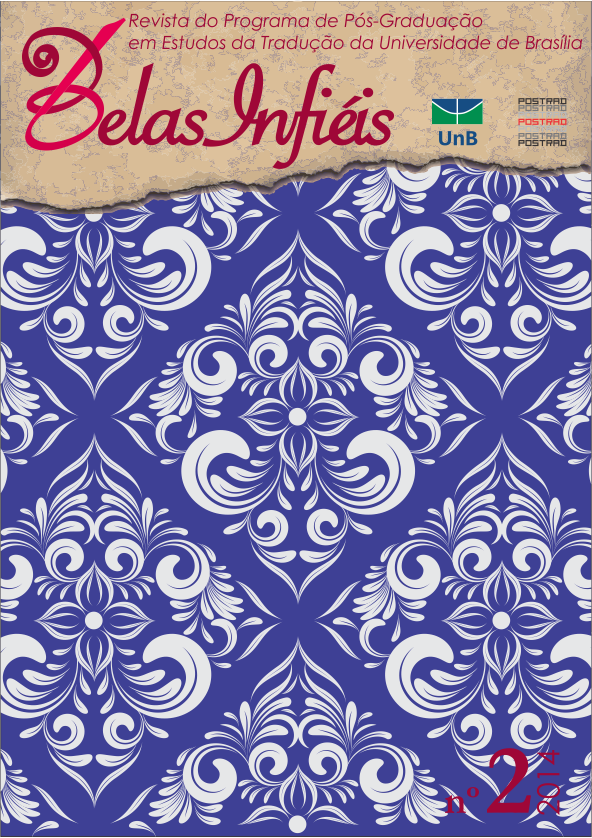QUANDO O NACIONAL É O MUNDO:
DISCUTINDO O LOCUS DE ENUNCIAÇÃO TRADUTÓRIO E AUTORAL NUM POLISSISTEMA MULTICULTURAL PÓS-INDEPENDENTE
DOI:
https://doi.org/10.26512/belasinfieis.v3.n2.2014.11278Palabras clave:
Tradução, Pós-independentismo, Entre-lugar, Multiculturalismo, PolissistemaResumen
Partindo dos conceitos de “local” e “cosmopolita”, de Antonio Candido, que opôs dialeticamente dois locais de fala, o presente artigo pretende discutir o local autoral e tradutório no polissistema multicultural, que tem local e cosmopolita no mesmo espaço e tempo. Sob essa perspectiva, em qual desses dois locais fala um autor pós-independentista? Silviano Santiago sugere um terceiro lugar, o “entre-lugar”, o qual representa um novo momento da crítica literária. Esse momento gera novas questões também na crítica tradutória, ora repensando antigos posicionamentos teóricos, ora sugerindo novos. Além disso, levanta a questão fundamental da construção do estereótipo, a exotização e o papel do tradutor como (des)continuador dessa prática, uma vez que o encontro do leitor com o texto se faz não mais no doméstico nem do estrangeiro, exclusivamente.
Descargas
Citas
BHABHA, Homi K. O local da cultura. Tradução de Myriam Ávila; Eliana Lourenço de Lima Reis; Gláucia Renate Gonçalves. Belo Horizonte: Editora da UFMG, 1998. p. 395.
BERMAN, Antoine. A Tradução e a Letra ou O Albergue do Longínquo.Trad. de Marie Hélène Catherine Torres, Mauri Furlan e Andréia Guerini. Rio de Janeiro: 7Letras/ PGET, 2008.
CANDIDO, Antonio. Literatura e sociedade. Rio de Janeiro: Ouro sobre Azul, 2006.
______. A educação pela noite e outros ensaios. São Paulo: Editora Ática, 1989.
CASANOVA, Pascale.A tragédia dos “homens traduzidos”. A República Mundial das Letras. Trad. Marina Appenzeller. São Paulo: Estação Liberdade Ltda, 2002.
EVEN-ZOHAR, Itamar. Interference in Dependent Literary Polysystems. In: Poetics Today11:1, 1990. p. 79-83.
MACEBUH, Stanley. Poetics and Mythic Imagination. In: JEYIFO, Biodun (ed). Perspectives in Wole Soyinka: freedom and complexity. Mississippi: University Press of Mississippi, 2001. p.27 -40.
MESCHONNIC, Henri. Ethics and Politics of Translating. Trad. e ed. de Pier-Pascale Boulanger. Amsterdam/ Philadelphia: John Benjamins Publishing Company, 2007.
MIRANDA, Carlos Eduardo Ortolan.Silviano Santiago: “Literatura éparadoxo”[entrevista]. s/d. Disponível em <http://p.php.uol.com.br/tropico/html/textos/2375,1.shl>, acesso em 02 de agosto de 2014, Ã s 00:32.
OUSTINOFF, Michaël. Tradução: história, teorias e métodos. Trad. de Marcos Marcionillo. São Paulo: Parábola Editorial, 2011.
SANTIAGO, Silviano. O entre-lugar do discurso latino-americano. In: Uma literatura nos trópicos:ensaios sobre dependência cultural. Rio de Janeiro: Rocco, 1971. p. 9-26.
SNELL-HORNBY, Mary. A “estrangeirização” de Venuti:o legado de Friedrich Schleiermacher aos Estudos da Tradução? In: Pandaemonium, São Paulo, v. 15, n. 19, Jul. /2012, p. 185-212. Disponível em , acesso em 2 de março de 2014, Ã s 17:26.
SOYINKA, Wole. Drama and the African World-view. In: Myth, Literature and the African World. New York: Canto, 2005. p. 37-60.
______. Theatre in African traditional cultures: survival patterns. In: JEYIFO, Biodun (ed). Modern African Drama. New York: W. W. Norton & Company, 2002.
RISTERUCCI-ROUDNICKY, Danielle. Introduction à l ´analyse des oeuvres traduites. Paris: Armand Colin, 2008.
VENUTI, Lawrence. The Translator’s Invisibility. A history of translation.London/New York: Routledge,1995 (Translation Studies 5)
Descargas
Publicado
Cómo citar
Número
Sección
Licencia
Copyright Statement
Given the public access to this journal, the texts are free to use but requires the recognition of the original authorship and initial publication in this journal to be properly stated.
The journal allows the use of works published for non-commercial purposes, including the right to submit the work to publicly accessible databases. Published contributions are the sole and exclusive responsibility of the author(s).
- When submitting papers to be evaluated by the Belas Infiéis journal, the author(s):
- Declare that the contents of the contributions are original and of their original creation, being entirely responsible for their content if there is an objection by third parties.
- Claim to be aware that they should not commit academic plagiarism.
- Declare that the manuscript has not been published, completely or partially, in Portuguese or another language. If it is a translation it should be submitted to the Translated Articles section.
- Declare that the manuscript is not being evaluated by other journals.
- Declare that the manuscript was not submitted to another journal simultaneously.
- Commit(s) to inform the journal of any kind of error or inaccuracy in their contribution (published, in evaluation or in editing) and to collaborate with the editors to make due corrections of the article (when in evaluation or editing) or erratum/retraction (after publication).
- Declare that there is no conflict of interest regarding the published work.
- Authorize its release if it is accepted for publication without any kind of monetary compensation.
- Agree to assign non-exclusive rights to publication to the magazine, remaining free to make their contribution available in other media as long as the publication of the first version in Belas Infiéis magazine is mentioned. They also authorize Belas Infiéis to assign their texts for reproduction in content indexers, virtual libraries and similar platforms.
- Maintain copyright and grant the journal the right of first publication, the work being licensed under theCreative Commons Attribution License.
- Is/Are allowed and encouraged to publish and distribute their work online after the editorial process, which may increase the impact and citation of the published work.
- Authorize the editorial team to make textual adjustments and to adapt the article to the publication rules, when necessary.



















